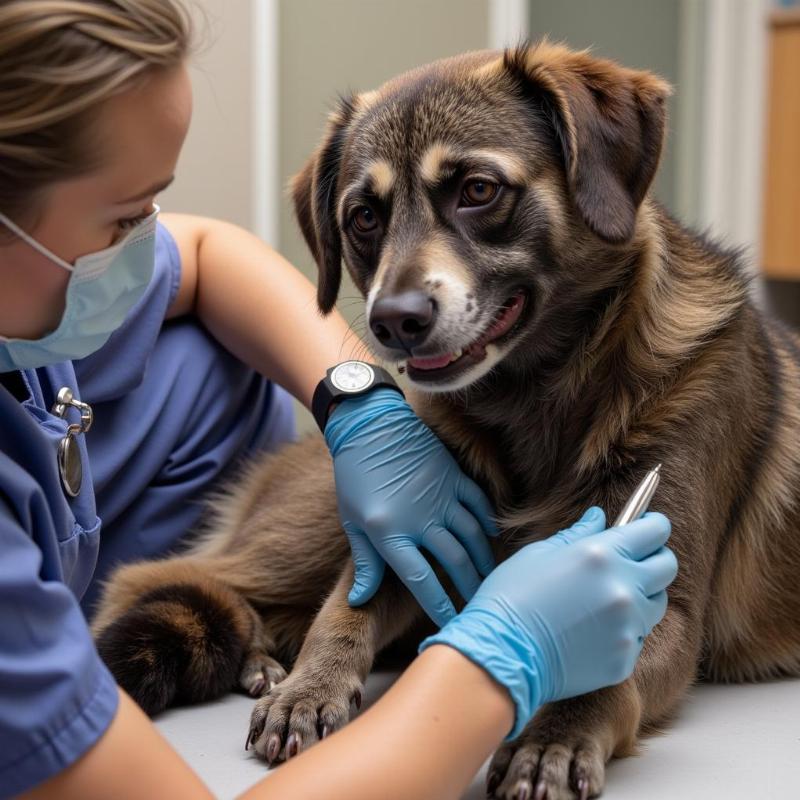If your dog has been bitten by a raccoon, it’s natural to be worried, especially considering the risks of rabies. Even if your dog is vaccinated against rabies, a raccoon bite requires immediate attention. This article will guide you through the necessary steps to ensure your dog’s safety and well-being after such an incident.
Why Act Fast Even If Your Dog is Vaccinated?
While rabies vaccinations significantly reduce the risk of infection, no vaccine is 100% effective. A bite from a rabid raccoon still poses a potential threat. Swift action is crucial to minimize any potential risks and protect your furry friend. Additionally, raccoon bites can cause serious injuries and infections beyond rabies, so prompt veterinary care is essential.
Immediate Steps After a Raccoon Bite
- Safety First: Ensure your own safety first. Do not approach the raccoon. If it’s still present, contact your local animal control.
- Restrain Your Dog: Gently restrain your dog to prevent further injury or the spread of any potential infection.
- Wash the Wound: Thoroughly cleanse the bite wound with soap and water. This will help remove dirt, debris, and potentially infectious saliva.
- Contact Your Veterinarian: Immediately call your veterinarian to inform them of the incident and schedule an appointment. Time is of the essence.
What to Expect at the Vet
Your veterinarian will assess the severity of the bite wound and determine the appropriate course of action. They will likely recommend a booster rabies vaccination, even if your dog’s vaccinations are up-to-date. This booster shot provides an extra layer of protection. The veterinarian may also prescribe antibiotics to prevent bacterial infections. They may also recommend additional tests or treatments depending on the extent of the injuries.
Rabies Risk Assessment
While your dog’s vaccination status is a significant factor, other factors influence the risk of rabies transmission. These include the geographic location (rabies prevalence in the area), the severity of the bite, and the raccoon’s behavior. Your veterinarian will discuss these factors with you to assess the overall risk.
 Veterinarian examining a dog after a raccoon bite
Veterinarian examining a dog after a raccoon bite
Preventing Future Encounters
- Secure Your Property: Take steps to prevent raccoons from accessing your property, such as securing garbage cans and eliminating food sources.
- Supervise Your Dog Outdoors: Always supervise your dog when they are outside, especially at night when raccoons are most active.
- Avoid Contact with Wildlife: Teach your dog to avoid contact with wildlife. Do not allow them to approach or interact with raccoons or other wild animals.
What if the Raccoon Cannot Be Found?
If the raccoon that bit your dog cannot be located and tested for rabies, your veterinarian may recommend a precautionary rabies quarantine, depending on local regulations and the circumstances surrounding the bite.
Conclusion
A raccoon bite, even on a vaccinated dog, necessitates immediate veterinary attention. By following the guidelines outlined in this article, you can significantly reduce the risk of rabies and ensure your dog’s swift recovery. Remember, quick action and communication with your veterinarian are key to protecting your furry companion.
FAQ
- My dog was vaccinated last year. Does he still need a booster? Possibly. Consult your vet immediately for their professional recommendation.
- What are the signs of rabies in a dog? Changes in behavior, aggression, excessive drooling, difficulty swallowing, and paralysis are some potential signs.
- Can raccoons transmit other diseases besides rabies? Yes, they can carry various parasites and bacteria.
- How long does a rabies quarantine last? It varies by state but typically ranges from 45 to 180 days.
- How can I prevent raccoon bites in the future? Secure your property, supervise your dog outdoors, and avoid contact with wildlife.
- Is it expensive to treat a raccoon bite? The cost varies depending on the severity of the bite and necessary treatments.
- Should I report the raccoon bite to animal control? Yes, reporting the incident can help track potential rabies cases in your area.
Related Articles
- how do you know if dogs have rabies
- can a dog get rabies after being vaccinated
- dog behavior after rabies vaccination
- can dog get rabies if vaccinated
- my dog was bit by a raccoon
Beautdogs.us is your premier online resource for comprehensive dog care information, breed-specific advice, and the latest product recommendations. We’re a trusted source for both new and experienced dog owners, offering expert guidance on everything from nutrition and training to health and wellness. Contact us today for personalized support! Email: [email protected], Phone: +1 501-555-7529. Visit Beautdogs.us for more information.